Why Google Location Tracking Is Always Activated & How to Stop It
Have you ever considered just how much Google knows about where you are? Suppose you're finding your way to a new restaurant or looking up the weather. In that case, Google location tracking silently works behind the scenes, gathering information to improve your experience. But does that mean Google - or someone else - can follow your every step? This article will demystify how this feature works, who gets to see your location history, and what you can do to reclaim your privacy.
In this article:
- Part 1. Does Google Track Your Location?
- Part 2. How Do I Turn Off Google Tracking My Location?
- Part 3. How To Track Someone's Location?
- Part 4. Can You Tell If Someone Is Checking Your Google Location?
- Part 5. How to Stop Someone From Tracking My Location?
- Part 6. Can Someone See My Location If They Have My Phone Number?
Part 1. Does Google Track Your Location?
Yes, Google does know your location, but the degree of tracking is in your control based on your configuration and use of Google services. Suppose you turn on Location History, Google logs, and save your movement history to enhance services such as Maps, personalized suggestions, and ads based on location. If you turn off Location History, Google might still determine where you are with GPS, Wi-Fi, and IP addresses with other features such as Web & App Activity.
For instance, when searching for nearby coffee shops or searching for directions through Google Assistant, a live location tracker with Google Maps is dependent upon location tracking to bring relevant outputs. Although such functionality increases convenience, privacy issues emerge mainly because users are unsure about what is being harvested.
So, does Google track where you are? Yes - but you can control it. In the next chapter, we'll look at how to review and control these settings to safeguard your privacy.
Part 2. How Do I Turn Off Google Tracking My Location?
To turn off Google location tracking, you must modify essential settings on your Google account and devices. Here's how:
1.Turn Off Location History
If you need to turn off Google location tracking, the first thing to do is turn off Location History. To turn it off, navigate to Google's Activity Controls, locate the Location History, and switch it off. When disabled, to ensure that Google does not record your movement history, click Pause to confirm.
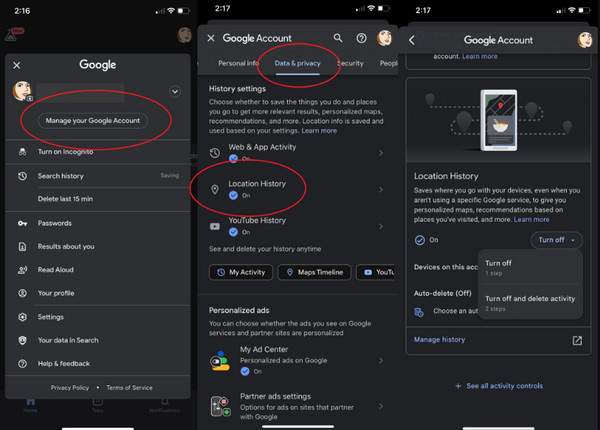
2.Disable Web & App Activity Tracking
Disabling location history isn't sufficient, but Google can still tap into location history through Web & App Activity. To turn that off, go to the same Activity Controls page, find Web & App Activity, and toggle it off. If it's offered, choose Don't include precise location to help restrict tracking even more.
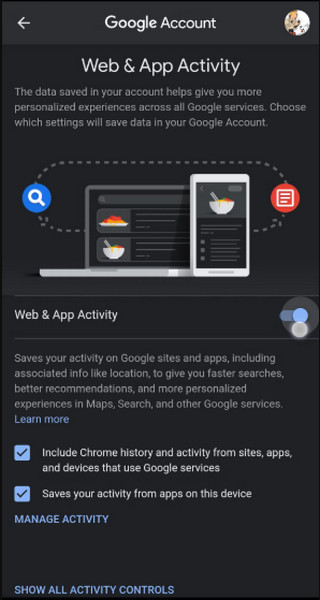
3.Adjust Device Location Settings
Next, change your device's location settings so that apps and services cannot access your location. On Android, go to Settings > Location, turn it Off, and check App Permissions to limit individual apps. On iPhone, open Settings > Privacy > Location Services, then toggle it Off in its entirety or set up personalized permissions for unique apps.
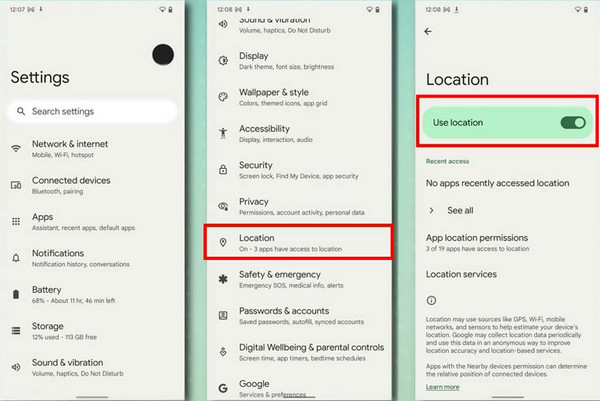
4.Stop Google from Collecting Location Information
Even after clearing these settings, tracking location with Google might continue to hold recent location history. To avoid this, periodically clear your Google Maps Timeline and employ Incognito Mode in Google Maps to prevent it from storing your location history.
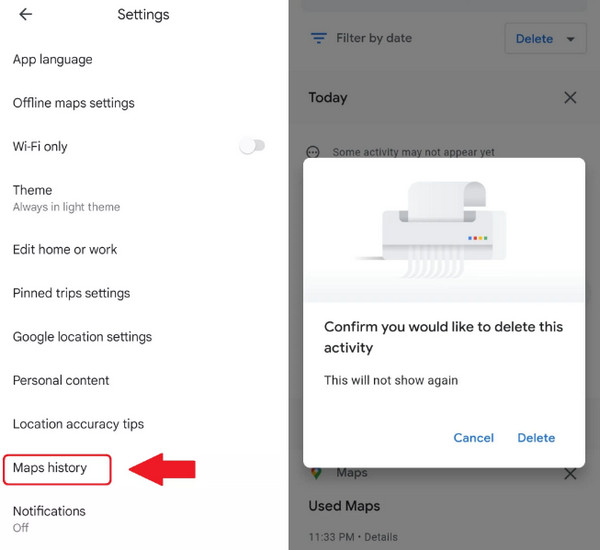
Bonus: How to Not Get Track by Google Live Tracking Location
If you want a trusty means of entirely masking your location, then imyPass iLocaGo is your solution. It is a mighty GPS location spoofer capable of spoofing your location on Android and iOS platforms to make it look like you are anywhere globally. Whether you want to enhance your privacy, test location-dependent apps, or circumvent geo-restrictions, iLocaGo gives you an unparalleled and effortless experience. Plus, if you're going to set a fake location on Google Maps so no one can track you, seize total control of your online presence - test iLocaGo today and easily protect your privacy!
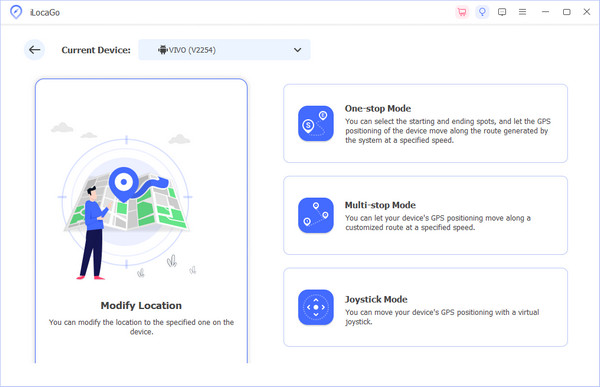
Part 3. How To Track Someone's Location?
If you have to monitor someone's location - whether it's to locate a lost phone or ensure a loved one is safe - Google's Find My Device is among the most valuable tools. This integrated Android feature lets you locate, lock, or wipe a lost phone from a distance. To utilize the targeted device, you must be logged in with a Google account, location services must be turned on, and internet-enabled.
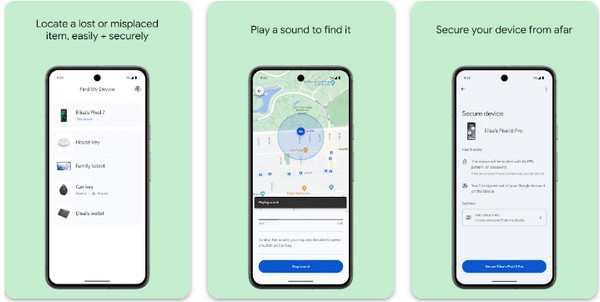
All you need to do is go to the Find My Device website or use the app on a different device, log in with the same Google account, and choose the device you wish to locate. The application will show its current location on a map, with the facility to play a sound, lock the device, or wipe data if needed. Though this utility is meant for personal safety and lost devices, this Google track location phone should be used ethically and only with appropriate permission.
Part 4. Can You Tell If Someone Is Checking Your Google Location?
Google does not directly notify you when someone looks at your location, but there are some methods through which you can determine if your location is being viewed. If you share your location using Google Location Sharing on Google Maps, you can find a list of users who have permission to view your current location. To do this, open Google Maps, tap your profile picture, select Location Sharing, and check who can view your location.
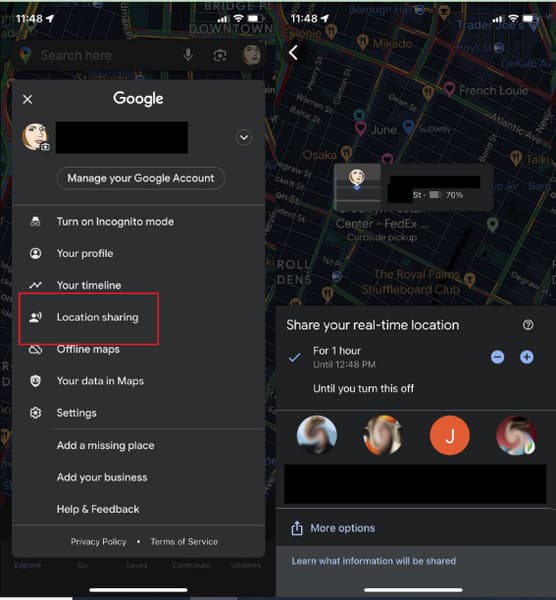
Furthermore, if you unexpectedly get Google security notifications, including sign-ins on unfamiliar devices, it may reflect unauthorized access to your account, which may cover your location information. For added protection, inspect your Google Account Activity periodically, activate two-factor authentication, create a fake GPS location, and modify your location-sharing settings to allow only known people access to your location.
Part 5. How to Stop Someone From Tracking My Location?
If you believe Google Maps' location tracker is tracking your location, here are a few things you can do to protect yourself. To begin with, disable Location Services on your phone by accessing Settings > Location on Android or Settings > Privacy > Location Services on iPhone and switching it off. Next, examine the app permissions to see which apps access your location and turn off unnecessary ones.
Also, turn off Google Location History and Web & App Activity by going to Google's Activity Controls and deactivating tracking features. If you have shared your location with someone using Google Maps Location Sharing, you can withdraw access by going to Google Maps > Profile Picture > Location Sharing and deleting individual users.
Part 6. Can Someone See My Location If They Have My Phone Number?
No, having your phone number alone does not allow someone to track your location. Even though there is a website that promises to track cell phone locations free of Google Maps no signup, if you've shared your location through Google Maps, Find My Device, or social media apps, someone with access to those accounts might be able to see it. Be cautious of scam websites that claim to track a phone using just a number - they are often fake or used for phishing. To remain secure, check your location-sharing options, don't click on strange links, and turn on two-factor authentication to secure your accounts.
Conclusion
Finally, track location with Google will only activate when you permit it to track you. Though turning off the tracking option can be a good choice for people mindful of their location being leaked, knowing when to activate and turn it off is still a better choice.
Hot Solutions
-
GPS Location
- Best Pokemon Go Locations with Coordinates
- Turn Your Location Off on Life360
- Fake Your Location on Telegram
- Review of iSpoofer Pokemon Go
- Set Virtual Locations on iPhone and Android
- Review of PGSharp App
- Change Location on Grindr
- Review of IP Location Finder
- Change Mobile Legends Location
- Change Location on Tiktok
-
Unlock iOS
-
iOS Tips
-
Unlock Android

